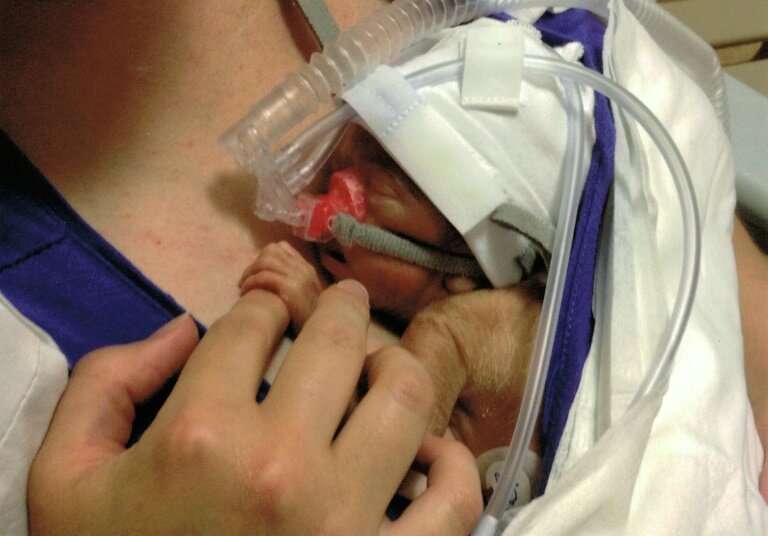New studies confirm improved survival of extremely preterm babies

Survival rates of extremely preterm infants have improved by leaps and bounds since the 1980s, with US and Swedish studies published this week providing new data on the trend.
Doctors previously estimated the earliest gestational age a baby could be considered viable outside the womb was 28 weeks, when they weigh around 2.2 pounds (one kilogram)—about 12 weeks short of the 40-week length of a normal pregnancy. Babies are considered premature under the 37-week mark.
But over the last nearly 40 years, that 28-week limit has steadily dropped, and now some babies delivered at 24, 23 or even 22 weeks (measured from their mothers' last menstruation) are able to survive, even as they weigh 1.1 pounds or less.
A Japanese baby who weighed only 9.44 ounces (268 grams) when he was born at 24 weeks made headlines in February: he was headed home in good health after five months in the hospital.
"I've been in this business for 40 years, and I've seen the threshold of viability move back about one week every 10 years or so in my practice," Edward Bell, a neonatologist at the University of Iowa Children's Hospital, told AFP.
Sweden holds the world record for earliest neonatal viability: 77 percent of babies born between 22 and 26 weeks in 2014 to 2016 survived one year, up from a 70 percent about 10 years before, according to a study published Tuesday in the the Journal of the American Medical Association (JAMA).
In those 10 years, Sweden standardized its procedures for neonatal advanced life support: immediate intubation at birth, administration of drugs and a quick transfer to a neonatal intensive care unit (NICU).
Nearly 90 percent of deliveries in Sweden now occur in one of six hospitals in the country that have top-level NICUs.
"Before, for a baby born at 22 or 23 weeks, an individual doctor could say that it is not worthwhile to do anything," said Mikael Norman, coauthor of the Swedish study and a neonatologist at Karolinska University Hospital in Stockholm.
For infants younger than 22 weeks, the survival rate has improved from 3.6 percent to 20 percent over the last decade, and for those born at 26 weeks, eight in 10 survive.
US lags behind
Since the 1990s, there have been three major medical advances in the effort to improve premature infant survival.
Artificial surfactants help keep babies' poorly developed lungs inflated when they exhale, while maternal steroid injections right before birth can speed up fetal lung development (growing as much in one day as what might usually take a week) and improved mechanical ventilation techniques also help premature babies.
These techniques are widely available in developed countries, but significant disparities remain—from country to country and even between various hospitals.
In Britain, France and the United States, about half of extremely preterm infants (less than 26 or 27 weeks) survive, according to studies conducted in the last few years.
And the US system is not equivalent to its Swedish counterpart. American health care is rife with inequalities that can play out in the level of antenatal care pregnant women in different demographics receive.
A study in JAMA shows that geographic racial segregation in the US manifests itself in health care, as premature black infants have a greater likelihood of being born in lower-quality hospitals.
But the survival rate is still improving, even in the very rare instance of babies who are born weighing under 14 ounces, the subject of a third JAMA study—focused on US data—published Monday.
Of infants born between 22 and 26 weeks and weighing less than 14 ounces in 21 US hospitals between 2008 and 2016, 13 percent survived—one of them weighed only 11.6 ounces.
At such a low gestational age, the risk of complications is much higher, as three fourths of children born that early show developmental delays at age two.
All told, "it tells you that survival is possible," said Bell, a coauthor of one of the US studies.
"One can't say clearly that these babies should be always resuscitated," Bell said, "but parents deserve to have this information and probably should have a say in whether they're resuscitated."
More information: Association Between Year of Birth and 1-Year Survival Among Extremely Preterm Infants in Sweden During 2004-2007 and 2014-2016 JAMA (2019). DOI: 10.1001/jama.2019.2021
© 2019 AFP
















